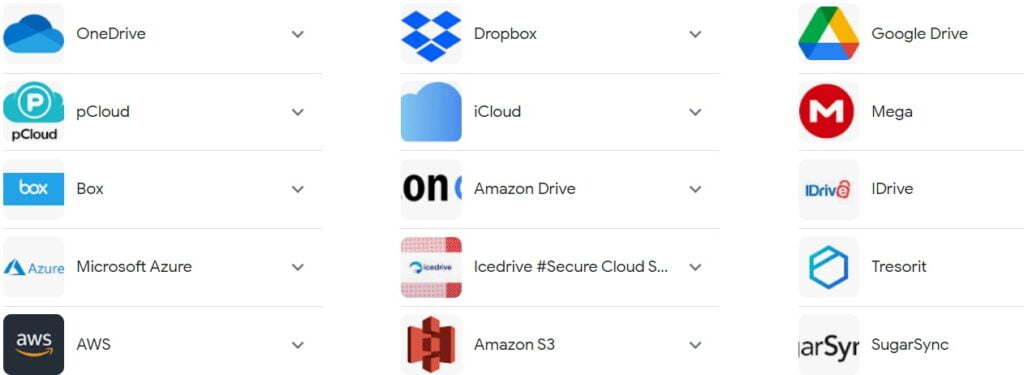Exploring the Different Types of Cloud Storage and Top 5 Service Providers
In an era where digital data reigns supreme, the need for reliable and accessible storage solutions has never been more critical. Cloud storage has emerged as a cornerstone of modern data management, offering individuals and businesses alike the ability to store, manage, and access their data remotely. From personal photos to corporate documents, the cloud provides a range of storage options tailored to diverse needs. Let’s delve into the various types of cloud storage and explore the top five service providers.
Types of Cloud Storage
1. Public Cloud Storage
Public cloud storage is provided by third-party service providers and made available over the internet. It offers scalable and cost-effective solutions, where users pay for the storage capacity they consume. Providers manage the infrastructure, ensuring high availability and accessibility.
2. Private Cloud Storage
Contrary to public cloud storage, a private cloud is dedicated solely to one organization. It can be hosted on-premises or by a third-party provider and offers greater control, customization, and security. Private clouds are often preferred for sensitive data and compliance-driven industries.
3. Hybrid Cloud Storage
Combining aspects of both public and private clouds, hybrid cloud storage allows data and applications to be shared between them. This setup provides flexibility, enabling organizations to utilize the scalability of the public cloud while keeping critical data within a more secure private infrastructure.
4. Personal Cloud Storage
Personal cloud storage services cater to individual users, offering a convenient way to store and access personal files and media. These services often provide limited free storage with options for additional space at a cost.
5. Enterprise Cloud Storage
Tailored to meet the complex needs of businesses, enterprise cloud storage emphasizes security, scalability, and collaboration tools. It often integrates features such as advanced encryption, compliance support, and seamless team collaboration.

Top 5 Cloud Storage Service Providers
1. Amazon Web Services (AWS) – AWS Cloud Storage
As a leading player in the cloud market, AWS offers a comprehensive range of storage services, including Amazon S3 for object storage, Amazon EBS for block storage, and Amazon Glacier for long-term archival.
2. Microsoft Azure – Azure Storage
Azure Storage provides scalable and secure cloud storage solutions, including Blob Storage for unstructured data, File Storage for file shares in the cloud, and Disk Storage for virtual machines.
3. Google Cloud Storage – Google Cloud Storage
Google’s cloud storage services encompass Google Cloud Storage for object storage, Cloud Filestore for file storage, and Persistent Disk for block storage, offering high durability and low-latency access.
4. Dropbox – Dropbox
Well-known for its user-friendly interface and file synchronization, Dropbox provides cloud storage for individuals and businesses, with features for seamless collaboration, file sharing, and version history.
5. Apple iCloud – iCloud
Catering primarily to Apple device users, iCloud offers seamless integration across Apple products, providing storage for photos, videos, documents, and device backups.
Each of these providers offers various storage tiers, pricing models, and additional features tailored to different user needs. Evaluating factors such as storage capacity, security measures, ease of use, and integration capabilities can help in choosing the most suitable cloud storage solution. Whether for personal use, business needs, or a blend of both, the versatility and convenience of cloud storage continue to revolutionize how we manage and access our data in an increasingly digital world.
you might also be Interested in reading related article – link
Frequently Asked Questions about Cloud Storage
What is cloud storage?
Cloud storage involves storing data on distant servers that are accessible via the internet, providing remote accessibility to stored information. It allows users to store, manage, and access their data from anywhere with an internet connection
How does cloud storage work?
Cloud storage works by storing data on remote servers maintained by a cloud service provider. Users upload their data to these servers, and it is accessible through a web-based interface or APIs.
What are the advantages of using cloud storage?
Some advantages include:
The accessibility of data allows for its retrieval from any location and at any given moment, facilitating seamless availability and usage.
Scalability: Users can easily scale up or down their storage needs.
Cost-effectiveness: Pay-as-you-go models allow users to pay only for the storage they use.
Disaster recovery: Data is stored redundantly, reducing the risk of data loss.
What are the different types of cloud storage?
Types include public, private, hybrid, personal, and enterprise cloud storage. Each serves different needs, offering varying levels of security, control, and scalability.

Is cloud storage secure?
Cloud storage providers implement various security measures such as encryption, access controls, and regular security updates. However, the level of security can vary among providers, and additional security measures may be needed for sensitive data.
what to consider when selecting the vendor?
Consider factors like storage capacity, security features, pricing models, ease of use, reliability, and customer support. Assessing your specific needs will help narrow down the options.
Is it possible to retrieve my data in the event of internet connection loss
Some cloud storage services offer offline access by allowing users to sync files locally. However, accessing data without an internet connection may be limited depending on the service provider.
If the cloud storage provider ceases operations, what becomes of my data?
Reputable providers have contingency plans and migration options in place in case of closure. It’s advisable to regularly back up critical data and choose providers with a good track record and migration policies.
Can I share files stored in the cloud with others?
Yes, most cloud storage services offer file sharing options, allowing users to share files or folders with specific individuals or groups via links or permissions.
How can I ensure the privacy of my data stored in the cloud?
Users can enhance data privacy by utilizing strong passwords, enabling two-factor authentication, encrypting sensitive files before upload, and being mindful of sharing permissions.




1 comment